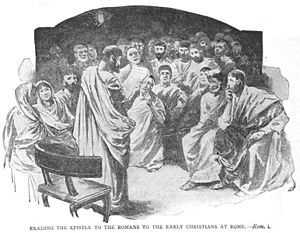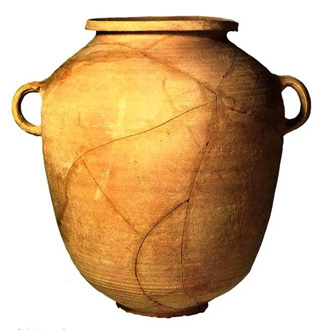====================
This sermon was preached on the Third Sunday of Easter, May 4, 2014, at St. Paul’s Episcopal Church, Medina, Ohio, where Fr. Funston is rector.
(The lessons for the day were: Acts 2:14a,36-41; Psalm 116:1-3,10-17; 1 Peter 1:17-23; and Luke 24:13-35. These lessons can be read at The Lectionary Page.)
====================
 Since the early 1970s this day, on the Episcopal Church calendar, this day on which we hear the story of Jesus’ appearance to the two disciples on the road to Emmaus has been known as Star Wars Sunday. It’s because Jesus is very much like a Jedi in this story. I mean, think about it . . .
Since the early 1970s this day, on the Episcopal Church calendar, this day on which we hear the story of Jesus’ appearance to the two disciples on the road to Emmaus has been known as Star Wars Sunday. It’s because Jesus is very much like a Jedi in this story. I mean, think about it . . .
In the Star Wars movies, Luke Skywalker is mentored first by Obiwan Kenobi, who dies, then by Yoda, who also dies. But both Obiwan and Yoda come back! They appear to Luke and others after their deaths, continue to teach and give sage counsel, and disappear. That’s what happens with Jesus in the story Luke tells us this morning.
It’s still Easter Sunday. (For us, we’re three weeks down the road, but for them it’s the afternoon of the same day on which Mary Magdalene and the others found the empty tomb.) Two disciples, one named Cleopas and the other unnamed (let’s call him “Bob” — although some feminists scholars suggest that the reason this disciple is not named is because she is a woman, so it might be “Bobbie”) are on their way to a village called Emmaus. Luke tells us this village is seven miles from Jerusalem; that’s a long walk — two or three hours. Sometime during this long afternoon journey, they are joined by a stranger whom they do not recognize; the stranger, Luke reveals, is Jesus but Cleopas and Bob can’t recognize him. They have a long talk with him about all the thing that have happened in Jerusalem in recent days, and he gives them sage counsel about the meaning of scripture, particularly the messianic prophecies. They arrive in Emmaus early in the evening and encourage their traveling companion to join them at dinner.
They sit down at an inn for the evening meal and the stranger takes the lead. He takes the bread served by the innkeeper, offers a blessing, and breaks the bread. Now, Cleopas and Bob realize who this is. As he does the same thing he had done with his followers just a few days before, their memory is tweaked and their eyes are opened (which suggests that Cleopas and Bob were in the upper room in Jerusalem on Thursday evening). That’s when they recognize him; that’s when they think they’ve figure out who he is — he’s Jesus the Jedi. And that’s when Jesus vanishes.
Why do you suppose that is? Why does Jesus disappear?
Well . . . let me remind you of what happened earlier in the day as the story is told by John. Mary Magdalene came to the tomb early in the morning, found it empty, and told Simon Peter. Peter and the disciple whom Jesus loved (another unnamed follower!) also found it empty, and then returned to their home to tell the others. Mary, however, hung behind and encountered Jesus but, like Cleopas and Bob on the road to Emmaus, she did not recognize him; she thought he was the gardener. Only when he addressed her by name (perhaps because of the tone of his voice) was something in her memory triggered and she realized who he was. She called him “Rabbouni” (which means teacher) and apparently fell at his feet and grabbed hold of them, for Jesus says to her, “Don’t hold on to me.” I think he did so for the same reason he disappeared from the table at the Emmaus inn.
Similarly, remember what happened before they arrived in Jerusalem, when Jesus took Peter and James and John up the mount of the Transfiguration. While they were on the holy mountain, the three disciples witnessed Jesus in conversation with Elijah and Moses. Peter wanted to memorialize the event by building booths, monuments to concretize the moment. Jesus said, “No. We’re not going to do that.” Again, I think for the same reason he disappeared in Emmaus.
That reason is that we cannot pin Jesus down. Jesus cannot be contained; he will not fit neatly into our boxes. When we think we have him figured out, we find out we are wrong. Jesus . . . God is bigger than any notion of him we may have; God is bigger than our conceptions, bigger than our doctrines, bigger than our creeds. And every encounter with Jesus is singular and unique. We cannot hold onto him; we cannot concretize and cast the moment in stone.
We just sang as our sequence hymn the old chestnut In the Garden, and that hymn makes this very point. We, the singer, say that we would like to stay there in that garden, but Jesus will not allow that:
I’d stay in the garden with Him,
Though the night around me be falling,
But He bids me go; through the voice of woe
His voice to me is calling.
We cannot pin him down! We cannot cast the moment in stone. When we think we’ve got hold of him, we find we are wrong; he disappears and what we are left with are our own notions, our own ideas, our own doctrines, our boxes. Our boxes, however, are too small; God is too big for them.
And the chorus of the hymn reminds us of the singularity and uniqueness of every meeting with our Lord:
And the joy we share as we tarry there,
None other has ever known.
Every time we encounter Jesus, the experience is unique; none other (not even our earlier selves) has ever had that experience before.
I think that is why it is significant that Cleopas and Bob recognized Jesus as he broke bread. Every loaf of bread is unique, similar perhaps to other loaves but never, ever identical. And every occasion on which bread is share is singular and unique. It may be a family meal or a celebration of the Eucharist; it may be a formal banquet or just friends having a bite. Whatever the circumstances, the situation is one unto itself, not like any other, never to be repeated.
A couple of Christmases ago, Evelyn gave me a set of books about the elements of the Eucharist. One volume is entitled The Spirituality of Wine; the other, which I have here, is The Spirituality of Bread by Donna Sinclair. The author is a Christian (in fact, I think she is an Anglican). I’d like to read you some of what she has to say about the symbolism of bread. About bread and community, she writes:
Jesus may have been lent significance by his association with other gods of bread. But that doesn’t acount for the power of his celebration, which persists daily around the world.
Everywhere, the words are similar: “He took a loaf of bread and after blessing it he broke it, gave it to them and said, ‘Take, this is my body.'” And, everywhere, people line up, blue-jean clad or robed, young or old, to receive bits of bread; or they sit in pews and pass tiny chunks on a plate; or they stand in a circle and murmur a blessing as a broken loaf moves from hand to hand.
Sometimes they gather around a sickbed.
Once, I sat in a circle of friends, in a smoky cabin in the bush, after a weekend of tending a woodstove and talking about dreams. We passed the bread around as gently as if it were the heart of the other, which it was.
The ritual has power. I get uneasy if I think I might be left out. Once, reporting on an event, I slipped up to take a photo of Archbishop Desmond Tutu serving Communion, and then paused anxiously. He winked and held out the bread.
Perhaps inclusion is this ceremony’s strength. This bread offers an enormous community, a family that stretches around the world and through the centuries. We don’t want to be left out.
We don’t want to be left out because we don’t want to miss the opportunity for that unique and singular encounter with Christ. Every celebration of Eucharist, like every sharing of bread and every meeting with Jesus, is a moment unto itself never to be repeated, never to be duplicated. We realize that in some way, that this encounter with Christ in the breaking of the bread will never happen again, and we don’t want to be left out.
With regard to bread and sacrifice, Ms. Sinclair writes:
The celebration of Communion is also a powerful experience of metaphor. Bread as body. Wine as blood. Love as sacrifice.
In the Jesus story, it is clear that love has great requirements. There is a price to pay, in an oppressive era, for feeding the unwanted.
It may help to see another story, that of the Celtic Earth goddess Tailtiu, queen of the Fir Bolg, one of the ancient peoples of pre-Christian Ireland.
When Tailtiu saw that her people were starving after an insufficient grain harvest, she took up an axe and, for a solid year, cleared a forest: “the reclaiming of meadowland from even wood by Tailtiu, daughter of Magmor,” is the way it is reported by the anonymous bard of The Dindsenchas, poems about Irish place names.
After the trees had been cut down, “roots and all, out of the ground,” the land became “a plain blossoming with clove,” presumably suitable for planting grain. But the cost was appalling. Tailtiu’s heart “burst in her body from the strain beneath her royal vest,” the bard says. The Celts loved their sacred groves, and the destruction to the enchanted richness of her forest must have broken Tailtiu’s heart.
Aware that she is dying, her courtiers gather around, and Tailtiu whispers her last command. She wants funeral games to be held in her honour each year, just before the harvest. And they are to be peaceful, she says, “without sin, without fraud, without reproach, without insult, without contention, without seizure, without theft.”
Thanks to her faithful foster-child Lugh (later associated with a bountiful harvest), Tailtiu’s wish came to pass. There was always an “unbroken truce” at her fair, and “men went in and came out without any rude hostility. Corn and milk in every stead, peace and fair weather for its sake, were granted to the heathen tribes of the Greeks for maintaining of justice.”
Tailtiu had given up her beloved forest and her life for a vision not too different from that of Archbishop Oscar Romero or of Mondawmin, who brought corn to the Ojibway. “Unbroken truce” and “corn and milk in ever stead,” represent the commonwealth of peace, the kingdom Jesus told his friends was close by. New parents get a glimpse of this kingdom looking at their tiny baby. Their sudden understanding that they would do anything to keep this child safe is the closest we can come, perhaps, to understanding the sacrifice that is part of love’s potential.
Perhaps that’s the power of Communion bread. Some say that it commemorates Jesus offering himself as a sacrifice for our sins, but I don’t think so. I would be appalled by a god who asked for the death of his child, or any child. But like any parent, I believe I would die for my children’s lives, even as absurdly grown-up as they are now.
Perhaps this bread simply expresses our wish to live little closer to the ideal of Tailtiu, Jesus, or Mondawmin, who died to give their people enough to eat. None of us can stand up to greed or selfishness as strongly as we wish. But eating this ceremonial bread with others, who also want to be just and loving, makes us brave enough to try.
Maybe that’s why I am sometimes overwhelmed at these ceremonies. Maybe I am simply terrified by the high sacrifices love assumes. Certainly the part most touching to me in the story of my own bread-god, Jesus, is not his death, but his constant focus on compassion. “Love one another as I have loved you,” he commands. “Love your enemies.”
Every encounter with this God who commands us to love, every encounter with love is unique and singular. Every encounter with this God who commands us to love, every encounter with love is larger than we can describe. We cannot constrain love in our boxes. Whatever our notions, our doctrines, our creeds, our understandings . . . they are too small to contain love, to pin love down, to hold onto and control love. When we try, love disappears, and that is why Jesus disappeared from the dinner table in that inn in Emmaus.
Now . . . I have to confess that, on the church’s calendar, this really isn’t Star Wars Sunday. But as every Star Wars aficionado knows, today is Star Wars Day: “May the Fourth be with you.”
But may Jesus the Jedi . . . Jesus, known in the breaking of the bread . . . Jesus, whom we cannot hold onto and pin down . . . Jesus, unique and singular . . . may Jesus be with you. Amen.
====================
A request to my readers: I’m trying to build the readership of this blog and I’d very much appreciate your help in doing so. If you find something here that is of value, please share it with others. If you are on Facebook, “like” the posts on your page so others can see them. If you are following me on Twitter, please “retweet” the notices of these meditations. If you have a blog of your own, please include mine in your links (a favor I will gladly reciprocate). Many thanks!
====================
Father Funston is the rector of St. Paul’s Episcopal Church, Medina, Ohio.
 Apparently Moses didn’t learn anything from his experience at the battle with Amelek when he needed Aaron and Hur to hold up his hands, so his father-in-law Jethro has to remind him that he can’t do it all alone and that, if he tries to do so, he will wear himself out. Smart man, Jethro!
Apparently Moses didn’t learn anything from his experience at the battle with Amelek when he needed Aaron and Hur to hold up his hands, so his father-in-law Jethro has to remind him that he can’t do it all alone and that, if he tries to do so, he will wear himself out. Smart man, Jethro! Since the early 1970s this day, on the Episcopal Church calendar, this day on which we hear the story of Jesus’ appearance to the two disciples on the road to Emmaus has been known as Star Wars Sunday. It’s because Jesus is very much like a Jedi in this story. I mean, think about it . . .
Since the early 1970s this day, on the Episcopal Church calendar, this day on which we hear the story of Jesus’ appearance to the two disciples on the road to Emmaus has been known as Star Wars Sunday. It’s because Jesus is very much like a Jedi in this story. I mean, think about it . . .  At first blush, this just feels like another unbelievable story of religious ritual and “magic hands.” It fits neatly into the pattern of war stories one finds in the Torah that are attributed to the Deuteronomist. For that writer, the Hebrews’ victory in battle always depends not on military preparation, strength of arms, or fighting skill, but on ritual exactitude — perform a religious ritual properly and you win, flub it and you lose.
At first blush, this just feels like another unbelievable story of religious ritual and “magic hands.” It fits neatly into the pattern of war stories one finds in the Torah that are attributed to the Deuteronomist. For that writer, the Hebrews’ victory in battle always depends not on military preparation, strength of arms, or fighting skill, but on ritual exactitude — perform a religious ritual properly and you win, flub it and you lose.  An ephah is a bushel, about 35 liters. Ten ephahs make a homer; a tenth of an ephah is an omer. (I’ll bet that was sometimes confusing.) So an omer is 3.5 liters, just a little bit shy of a gallon.
An ephah is a bushel, about 35 liters. Ten ephahs make a homer; a tenth of an ephah is an omer. (I’ll bet that was sometimes confusing.) So an omer is 3.5 liters, just a little bit shy of a gallon. Two days ago we celebrated the Feast of St. Mark the Evangelist and the Gospel lesson for use at the Eucharist was the opening of his Gospel which relates the story of Jesus’ baptism following which, Mark says, “the Spirit immediately drove him out into the wilderness,” (Mk 1:12) so the word “wilderness” caught my attention today.
Two days ago we celebrated the Feast of St. Mark the Evangelist and the Gospel lesson for use at the Eucharist was the opening of his Gospel which relates the story of Jesus’ baptism following which, Mark says, “the Spirit immediately drove him out into the wilderness,” (Mk 1:12) so the word “wilderness” caught my attention today. I am given to hyperbole. I know that. So, apparently, was David (the superscript to this psalm attributes it to David), as the first verse of today’s evening psalm amply demonstrates. I’ll bet he got into as much trouble (or maybe more) because of that as I get into!
I am given to hyperbole. I know that. So, apparently, was David (the superscript to this psalm attributes it to David), as the first verse of today’s evening psalm amply demonstrates. I’ll bet he got into as much trouble (or maybe more) because of that as I get into! My mind really isn’t on the scriptures this morning . . . except this idea of being informed of something before it occurs, so that when it does occur, one will be ready to accept it.
My mind really isn’t on the scriptures this morning . . . except this idea of being informed of something before it occurs, so that when it does occur, one will be ready to accept it. I think Jesus is being a little rough on Philip. Granted, Jesus has done everything possible during his ministry to make the Father known, to be transparent to those around him, to reveal as much of himself as he can. Still, it is possible to be with someone for years and still not know them.
I think Jesus is being a little rough on Philip. Granted, Jesus has done everything possible during his ministry to make the Father known, to be transparent to those around him, to reveal as much of himself as he can. Still, it is possible to be with someone for years and still not know them. “Better the devil you know than the devil you don’t know,” was something my grandmother often said. Apparently she took after the ancient Israelites . . . but then don’t most people. We would rather stay in (or return to) a bad situation than face a possibly worse predicament. God know these people well — not too much farther down the road they will complain about their hunger and long for the pots of stew they enjoyed as slaves:
“Better the devil you know than the devil you don’t know,” was something my grandmother often said. Apparently she took after the ancient Israelites . . . but then don’t most people. We would rather stay in (or return to) a bad situation than face a possibly worse predicament. God know these people well — not too much farther down the road they will complain about their hunger and long for the pots of stew they enjoyed as slaves: Psalm 136 is twenty-six verses long. The second half of every single verse is the same: “For [God’s] steadfast love endures for ever.”
Psalm 136 is twenty-six verses long. The second half of every single verse is the same: “For [God’s] steadfast love endures for ever.” 

